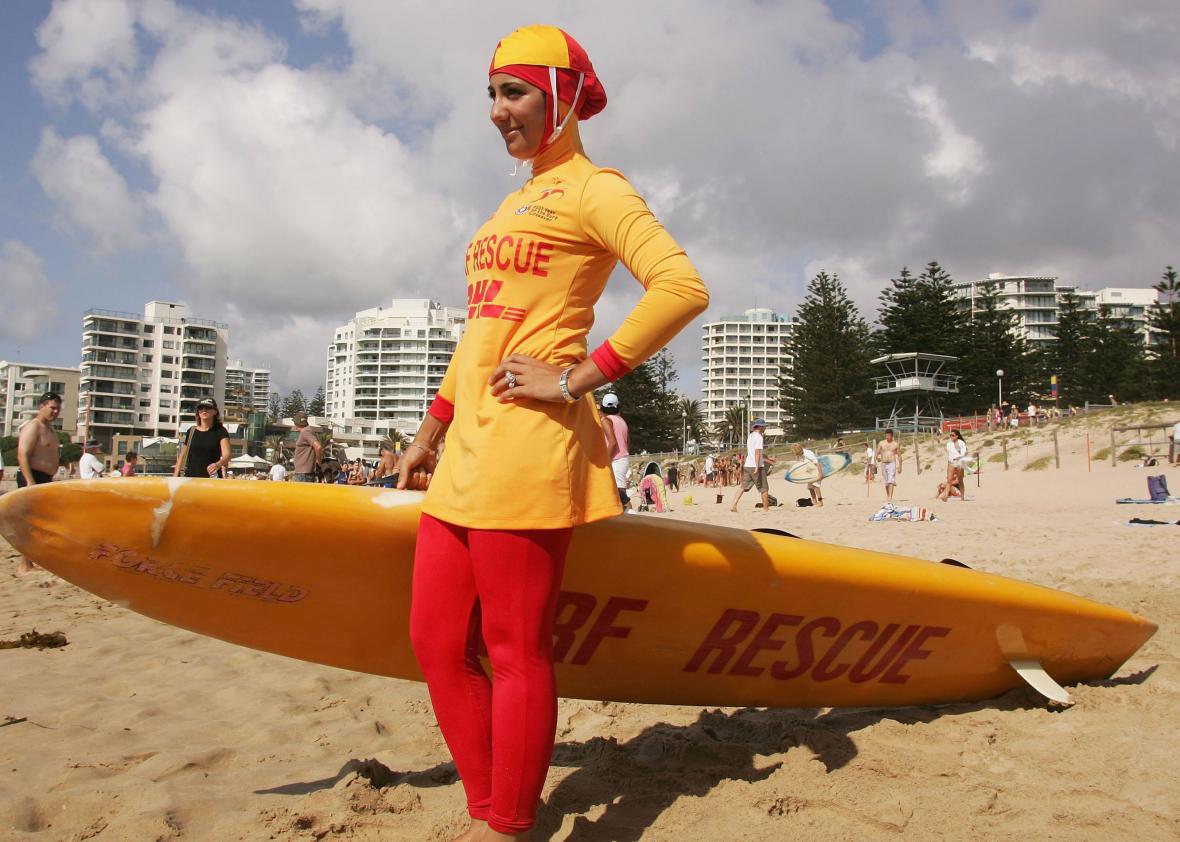As Islamophobia spikes in France following terrorist attacks in Paris and Nice, women’s bodies, and their beachwear, are the prime targets.
Five towns—including Cannes and Villeneuve-Loubet, both located near Nice on the French Riviera—have so far banned the “burkini,” a swimsuit with built-in sleeves, leggings, and a hood, and three more are moving to do so, as The New York Times reported Thursday. These laws are only the latest to penalize Muslim women in the name of France’s national precept of secularism, or “laïcité”— headscarves have been banned in public schools since 2004, and the niqab, or full-face veil, has been verboten in public places since 2011. When those laws passed, critics pointed out that only a fraction of French Muslims wore the proscribed garments in the first place, suggesting that the laws were more about promoting stigma than shaping behavior. The burkini bans seem to go one step further, sanctioning outright racial profiling.
The Times interviewed Marwan Muhammad, the executive director of the Center Against Islamophobia in France, which is mounting a legal challenge to the law in Cannes (a court in Nice upheld the ban, but the center is appealing the decision). He pointed out that there is no legal definition of a burkini. The Times writes:
He said that six Muslim women who complained to his center in the past week were asked to leave public beaches even though they were not wearing burkinis.
“One was wearing a long-sleeve T-shirt and pants with a head scarf, and another was wearing an actual competition bathing suit, like they wear in the Olympics, and a bathing cap, and she was taken off the beach,” Mr. Muhammad said.
However, he added, “her mother was wearing the hijab and was enjoying a picnic on the beach,” and the fact that she was Muslim and wearing a bathing cap was enough to cause local officials to ask her to leave.
Muhammad pointed out that burkinis themselves are a sign that many French Muslims are relatively liberal; in conservative Muslim countries, it would be unfathomable for women to join men at the beach, let alone in the water. “This is a good news in a way because it means Muslim women who didn’t used to enjoy that day at the beach or at the pool are now taking part, they are socializing,” he told the Times.
The French argument against burkinis doesn’t translate neatly into American culture. Where the U.S. largely views religion in terms of positive rights—you have the right to practice your faith—French laïcité is a negative right, guaranteeing freedom from the religious claims of others. As reporter Mimi Kirk writes at CityLab, “in France the state is shielded from religion, while in the United States religion is shielded from the state.” But Nicolas Cadène, the spokesman for the government’s Observatory on Laïcité, suggested to the Times that the principle is being exploited “for partisan ends and to stigmatize people.” French politicians’ condemnations of the burkini have openly stoked Islamophobia. Cannes mayor David Lisnar deemed burkinis a “symbol of Islamic extremism,” and Prime Minister Manuel Valls, coming out in support of the bans on Wednesday, called the burkini part and parcel of “the enslavement of women.”
Though the burkini’s purpose of promoting “modesty” reflects a view of female sexuality that may rankle many secular liberals, to suggest that any woman who wears one should be seen as somehow associated with extremism—and, by extension, terrorism—is hateful and irresponsible. As one Muslim woman pointed out in an interview with the BBC, this kind of state-sanctioned discrimination “just hands ammunition to those who want to … recruit to their twisted ideology.” And centuries of sexism won’t be reversed by France’s shockingly illiberal invasion into the private sartorial choices of individual women. As another woman told the BBC, “I think it’s outrageous that you would effectively be asked to uncover some flesh or leave.”
Besides, if the burkini evokes mixed feelings, its most popular alternative, the bikini, is a suspect instrument of liberation if ever there was one. (Things this writer avoids while wearing a bikini include swimming, eating, and making sudden movements.) The burkini’s creator, the Australian Aheda Zanetti, told Newsweek that between 35 and 45 percent of her customers aren’t Muslim. “You get a lot of women that are conscious about the exposure of skin [to the sun]. You get a lot of women that have just become mothers and are self-conscious,” she said in another interview. (Slate challenges anyone to observe these burkini-esque baby suits without wishing she, too, could rock one.) To Zanetti, the outfit symbolizes “freedom, healthy living, confidence.” If the debate over the burkini reminds us of anything, it’s that Islam and secular western culture share a propensity for telling women what to do with their bodies.
